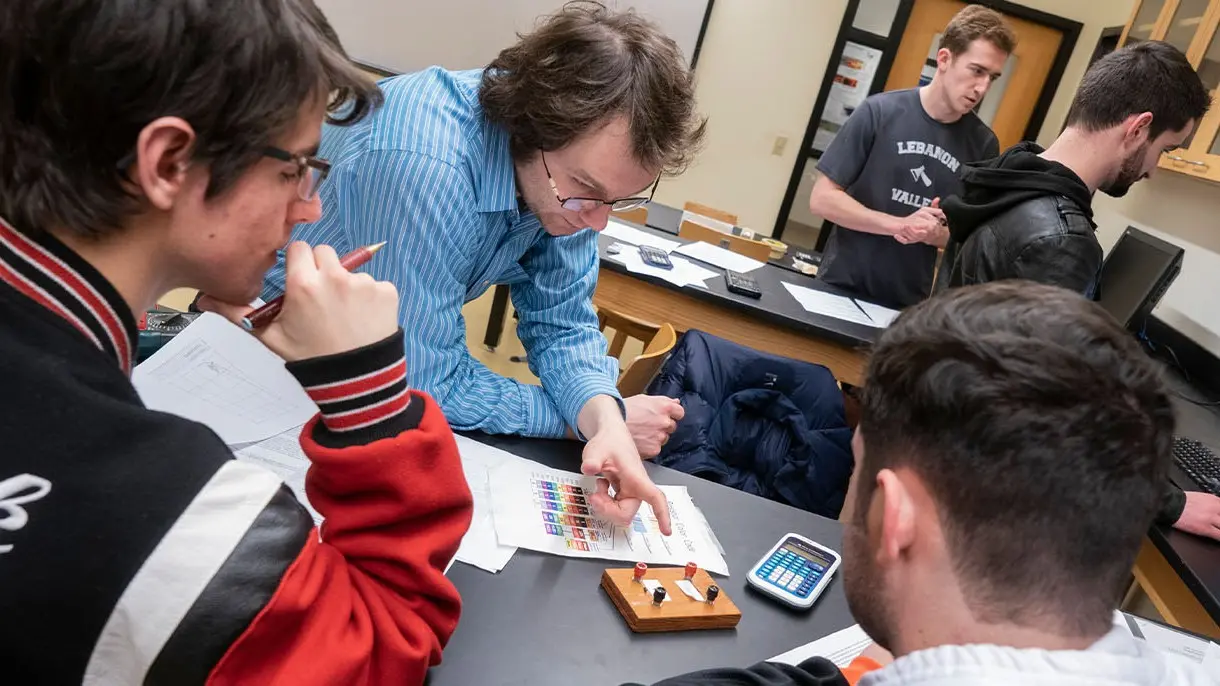
Physics Mission, Goals, & Objectives
The mission of the Physics Department is to give in-depth training in physics or engineering physics to our majors and minors through a student-centered program that emphasizes coursework and research opportunities focused on problem solving, critical thinking, experimental, and computational skills as well as technical written and verbal communication. Moreover, the Physics Department faculty are committed to professional activities that make noteworthy contributions to the scientific community, including at the national and international level. With expertise in their respective disciplines, the faculty engage students in high-impact research experiences and mentor them as future scientists. The department also vigorously supports students in obtaining external internship and research opportunities and preparing them for careers in industry, government, teaching, or graduate work in various subfields of physics and engineering. In addition, the Physics faculty further contribute to the educational goals of the College by teaching courses for general education that cultivate math and science literacy, quantitative reasoning, problem solving, and critical analysis of information and data, which also support other major programs (such as chemistry, biology, exercise science, athletic training, and physical therapy). Through its students, faculty, and extracurricular activities, the Physics Department strives to contribute to the academic and cultural environment of the College and academic community at large by providing opportunities and expertise in physics within a liberal arts environment.
The Physics Department Goals and Objectives
Goal 1: Graduates from our program will have a working understanding and knowledge of fundamental areas in physics/engineering.
- Objective 1.1: Students will use principles, laws, and basic concepts to solve and present problems and explain phenomena in the following areas of physics and engineering at the introductory level: fluid mechanics, thermodynamics, optics, special relativity, quantum mechanics, atomic and nuclear physics.
- Objective 1.2: Students will use principles, laws, and basic concepts to solve and present problems and explain phenomena in the following areas of physics/engineering at the introductory and advanced level: classical/engineering mechanics and electromagnetic theory/materials science.
Goal 2: Graduates from our program will have a working understanding and knowledge of mathematics along with computational skills necessary for advanced work in physics/engineering.
- Objective 2.1: Students will be able to solve problems and explain physical phenomena using the basic concepts of advanced mathematics as they apply to physics/engineering.
- Objective 2.2: Students will solve physics/engineering problems across the curriculum utilizing computers and be proficient in one or more programming languages.
Goal 3: Graduates from our program will be skilled in the methods of scientific research and investigation and/or engineering design.
- Objective 3.1: Students will formulate testable hypotheses/models; design appropriate experimental measurements or phenomenological methods to test these hypotheses/models; and collect, analyze, and evaluate experiment data or computational output.
- Objective 3.2: Students will conduct classic experiments illustrating key discoveries and fundamental techniques, acquire the ability to operate a variety of laboratory equipment, including the use of a computer in the collection and statistical analysis of experimental data, and design new experiments to test theoretical results and models.
- Objective 3.3: Students will be skillful in applying the engineering design process: defining a problem, identifying constraints on solutions and criteria for success, proposing solutions, selecting the best solution, creating a prototype, testing the prototype, and iterating.
Goal 4: Graduates from our program will have effective written and verbal communication skills.
- Objective 4.1: Students will present solutions to physics/engineering problems and results of experimental/theoretical investigations orally in various formats, including formal presentations, oral exams, one on one discussions with faculty, or by leading class discussions, using appropriate technical vocabulary and mathematical notation as related to physics/engineering.
- Objective 4.2: Students will present written solutions to physics/engineering problems and reports of experimental/theoretical investigations using appropriate technical vocabulary and mathematical notation as related to physics/engineering.
Goal 5: Students will apply learning in situations where they develop and hone professional activities and show evidence of an applied and integrated skill set.
- Objective 5.1: Students will apply learning in situations where they develop and hone professional activities that utilize their integrated skill set: research, presentations, internships, and post-LVC programs.
For more information on learning goals and outcomes, contact institutionalresearch@lvc.edu.


